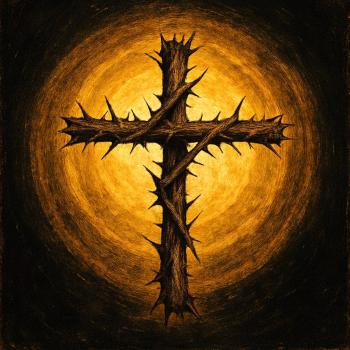Good Friday Script
The Seven Last Words of Christ? Only a Suffering God can Save
As far as memory reaches, I remember the songs of the cross, “The Old Rugged Cross,” “How Great Thou Art,” “Are You Washed in the Blood,” and “It is Well with My Soul.” But, one stands out, the African American spiritual, “Were You There When They Crucified My Lord.” As the song goes, “sometimes I causes me to tremble, tremble, tremble,” when I ponder the crucifixion of Jesus and the crucifixions that go on each day, whether in schools, borderlands, military invasions, or the brutalities of daily life, perpetrated by institutions as well as persons.
While I wasn’t there, historically speaking, I am part of that story and so are you. We know the distance between God and us, our failures to speak truth and seek justice. While I no longer believe that the story of atonement, “Jesus paid the price to God for our sins,” is the only story to be told, I recognize that the cross matters – that it is God’s solidarity with the world, God’s presence in our joy and sorrow, and Jesus’ willingness to sacrifice for God’s vision of Shalom, and the call for us to be God’s companions in healing the world.
In the words and music tonight, may you experience solidarity with those who suffer, and recognize, with Dietrich Bonhoeffer, that “only a suffering God can save.”
The Seven Last Words of Christ
The First Saying: Father forgive them, for they know not what they are doing. (Luke 23:34).
On the Cross, Jesus felt pain, and so did God! Jesus was abandoned, humiliated, and abused, and yet he forgave his tormenters and those who deserted him. God’s way was abandoned and mocked by wayward, self-interested humans, and the Parent felt the pain of the cross and the pain hidden within the violence of the religious and political leaders.
Forgiveness does not erase the impact of our decisions, nor does it erase the consequences of going against the moral and spiritual arcs of history. Turning from God’s vision alienates us from the wholeness God desires for us.
Still, forgiveness makes a way where we see no way forward. Forgiveness allows for the possibility of healing and transformation. Initially, accepting God’s forgiveness may mean more, rather than less, pain, but it is the pain of the “celestial surgeon,” whose spiritual interventions excise our hardheartedness, indifference, and sin, so that we might have a healed and empathetic hearts.
The Second Saying: Truly, I tell you, today you will be with me in paradise. (Luke 23:43).
Paradise amid pain. Everlasting life in this fleeting moment. Martin Luther once said, “in the midst of life, we are surrounded by death.” But, more importantly, “in the midst of death, we are surrounded by death.”
The Realm of God is Right Here in healing, hospitality, and spiritual and ethical transformation.
The moral and spiritual arcs cannot be defeated by our waywardness. Life and not death, and love and not hate, will win the day. God’s love endures forever.
The Third Saying: Woman, here is your son. And he said to the disciple whom he loved, here your mother. (John 19:26-27)
Dying does not excuse us from moral responsibility. On the Cross, Jesus looks beyond pain and death to the needs of others. He calls his mother to care for the beloved disciple, and he calls the beloved disciple to take responsibility for his mother’s well-being.
Death does not end our relationships; it transforms them. Jesus’ care for his mother models our own legacy to future generations. Jesus’ words to us might be: Behold this good Earth; take care of your mother. Behold children in pain; bless them with your love.
The Fourth Saying: My God, My God, why have you forsaken me. (Matthew 27:46 and Mark 15:34).
There is something universal about feeling alone and abandoned. We may have felt alone and without support as we sat with a dying parent or cared for a child with cancer; when we signed divorce papers; following physical, emotional, or spiritual abuse; or when we can no longer conjure feelings of love for God or an intimate companion. God seems utterly absent and we are lost in the abyss of isolation and unremitting pain.
Jesus’ prayer of abandonment is a prayer of faith. He addresses his pain to God and he calls upon God to respond. We too can bring our own cries of absence to the One to whom all hearts are open and all desires known.
The Fifth Saying: I am thirsty. (John 19:28).
Jesus’ pain was whole person pain, and not just physiological. We can assume his suffering was heightened by his sense of seeing the apparent defeat of his cause and God’s vision.
Jesus thirsted. He died, vulnerable, powerless, and tortured. If Jesus is truly God’s messenger, then God feels our pain. God thirsts for our salvation. God passionately seeks to heal the earth, and God experiences the pain of every dying person and the fear of children hiding from a shooter. Calvary points us to a thirsting God, the fellow sufferer who understands our pain, and the joyful companion who celebrates our elation.
The Sixth Saying: It is finished. (John 19:30)
Death punctuates our earthly lives. Each moment is perpetually perishing, dying that new experiences may emerge. As we reflect on Jesus’ sufferings, we might ask: What is finished? What ends on Calvary?
At first glance, it is obvious. Jesus’ work is done; he is now history. But, our personal history is always unfinished and subject to transformation at the hands of others. Our lives continue to shape those who follow us. Jesus’ ministry lives on in his words, wisdom, and healing touch which continue to transform us, initiating new creation and making a pathway within the wilderness of experience. Jesus’ life lives on in us.
The Seventh Saying: Father, into your hands I commend my spirit. (Luke 23:46)
Jesus’ final words reveal trust in the Loving Power that brought us into life and will receive us upon our deaths. We are not alone; we belong to God and nothing – abandonment, thirst, sin, or death – can separate us from the love of God.
In the darkness of the cross, our eyes begin to see. A glimmer of light casts out the darkness of fear and hopelessness. Calvary is tragic. Yet, there is a dazzling darkness in which God’s light shines, making the way of the cross, the way of life, and promising strength for today and bright hope for tomorrow. Thanks be to God for the living, loving, suffering, and healing Jesus, whose cross is the open door to solidarity with creation and an everlasting holy adventure with God as our companion.
Going Forth
Let us go forth, grateful for Jesus’ gift of life and his mission to transform us and the world. Let us go forth, recognizing that the way of the way of life, and that God is the fellow sufferer who understands and the joyful companion who celebrates. Let us go in peace, knowing that God is in the pain of the cross and the pain of the world, seeking healing and wholeness and our companionship as healers of the world. Let us go in peace, knowing that in the valley of the shadow of death God is with us…and that in the midst of death, God gives us life.
+++
Rev. Bruce Epperly Ph.D. has served as a professor, seminary administrator, university chaplain, and congregational pastor at Georgetown University, Wesley Theological Seminary, Lancaster Theological Seminary, and South Congregational Church United Church of Christ on Cape Cod. “Retired,” he continues to teach in the Doctoral of Ministry program at Wesley Theological Seminary, give seminars, write, and rejoice in grandparenting and marriage with Rev. Dr. Kate Epperly. An ordained minister in the United Church of Christ and Christian Church (Disciples of Christ), he is the author of over eighty books, “The Elephant is Running: Process and Open and Relational Theology and Religious Pluralism,” “Jesus: Mystic, Healer, and Prophet,” “Walking with Francis of Assisi: From Privilege to Activism,” “Simplicity, Spirituality, and Service: The Eternal Wisdom of Francis, Clare, and Bonaventure,” and “Taking a Walk with Whitehead: Meditations with Process-Relational Theology.” His books on faith and politics include, “Talking Politics with Jesus: A Process Perspective on the Sermon on the Mount,” “One World: The Lord’s Prayer from a Process Perspective,” and “Process Theology and Politics. His most recent texts are a trilogy: “Process Theology and Healing,” “Process Theology and Mysticism,” and “Process Theology and Prophetic Faith.” He may be reached at [email protected].












